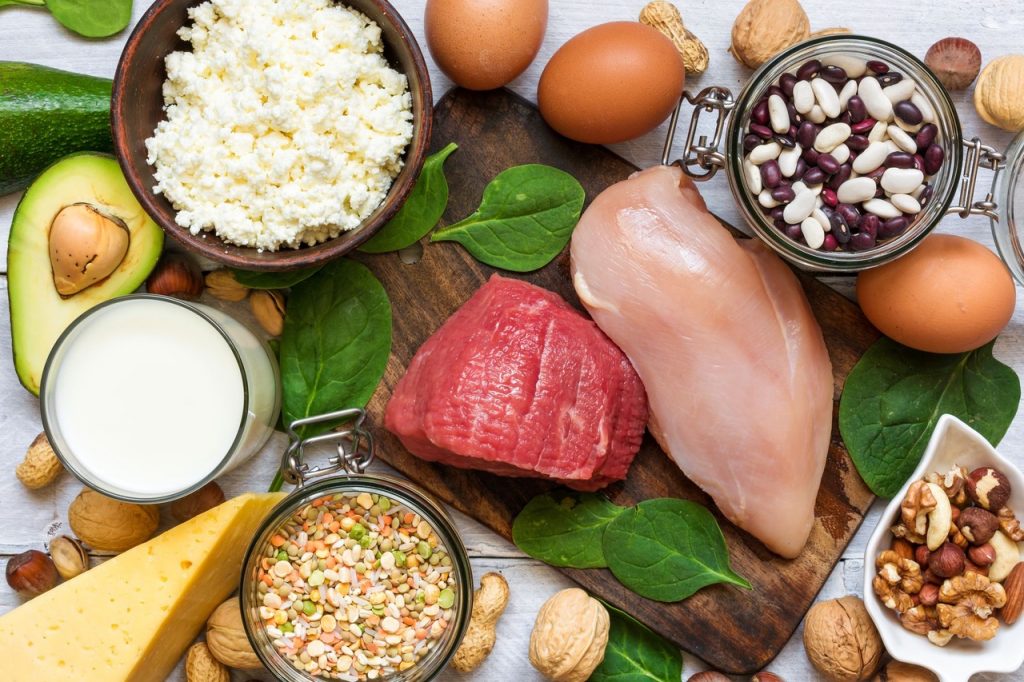What has protein got to do with weight loss?
I’m going to kick off this blog series with two big topics… Protein and weight loss.
In my experience protein generally falls into two categories for people; those that do not eat enough, and those that eat much more than they need.
One important thing to know is that protein is not something that just builds muscle. It does a whole load of other things as well.
It’s good to think of protein as lego structures. Those lego structures can be broken down into individual lego bricks that can be used to build other lego structures. Protein is the same, as when you consume it, it gets broken down into amino acids and those amino acids then build new proteins in the body which perform a huge variety of tasks, one of which is building/maintaining muscle.

Here are just a few things that proteins do in the body
Regulate processes in the human body
Catalysts for reactions through enzymes
Transport things in and out of cells
Provide structure eg muscles, bones, connective tissue.
Cell signalling
In simple terms they are molecules that perform tasks essential to life and optimal functioning.
So what does all of this have to do with weight loss?
In order to lose weight the body must be in a state of energy deficiency. That is to say that you burn more calories than you are consuming. When we are in an energy deficit we are under-fuelling our body for the daily demands placed upon it. The body is more likely to break down protein in the body (a large proportion of which will come from muscle resulting in less definition/muscle tone/shape or whatever you want to call it) as protein breakdown exceeds protein synthesis. This needs to be minimised as much as possible as most of us would like to lose fat, not muscle, when losing weight.
Therefore when we are trying to lose weight it is important to keep our protein intake at the right level. However the opposite usually happens as when we eat less, we usually eat less protein. In other cases there is a fear of becoming too bulky which means protein intake is minimised.
How much protein?
So what is the right level of protein intake?
My practical suggestion is 20-40g of quality protein every three to four hours.
That is not a hard and fast rule. You won’t wither away into a sloppy muscleless mess on the floor if you don’t stick to it. But its a good rule to aim for if losing a bit of fat and toning up is your goal.
Here’s why…
Protein breakdown and protein synthesis (building) occur independently all of the time. In normal circumstances there is a net zero meaning we neither gain nor lose protein. A few situations may change this, such as ageing (we naturally start to lose more muscle as we age past 40), and also if we are trying to lose weight. If our aim is to lose weight, or more specifically fat, then we need to maximise the rate of protein synthesis.
Studies by Moore et al. (2009) and Witard et al. (2014) showed that the rate of protein synthesis plateaus after intake 25-30g of quality protein in a meal. Consuming more than this results in negligible increases in protein synthesis.
Moore (2015) went one step further to account for differences in body mass. For instance a 50kg person should need less protein than a 100kg person. The study proposed that protein intake per meal should be 0.4g per kg of bodyweight.
This means that the following should be consumed for each individual:
50kg person 20g per meal
75kg person 30g per meal
100kg person 40g per meal
Does this mean that every time you eat some food it should contain this amount of protein? Not necessarily. It is ideal to space protein feeding every three to four hours. A study by Areta (2013) showed that protein synthesis was greatest when 20g of protein was consumed every 3 hours during a 12 however recovery period following a strength workout compared with 40g every 6 hours and 10g every 1.5 hours.
What can often happen in real life is that minimal protein gets consumed at breakfast, sometimes at lunch and a big serving tends to happen in the evening.
It is also worth noting that without any form of training (strength training in particular) the associated increases in protein synthesis will not be seen. That means you still have to go to the gym! The good news though is that the opportunity for protein synthesis will be elevated up to 48 hours post workout so its well worth the effort!
I’ve used the term quality protein. I’ll cover this in more detail in a future article, however in brief it means a food source that contains all of the essential amino acids (lego bricks) that the body cannot make itself. Meat, fish eggs and dairy and some plant based foods are examples of this.
Practical takeaways

What I hope you can take away from this is that protein is important for health, getting fit and looking good. For most people 20-30g of quality protein every three to four hours is optimal (but not essential). This could be breakfast, lunch, dinner and a snack for instance. Here are some examples of foods you can incorporate into your diet to work towards these recommendations below are all ‘quality’ sources of protein but could be
Tin of tuna (125g): 27.4g
Sirloin steak (100g): 21.6
1 Chicken breast (145g): 34.8g
Greek Yogurt (200g): 20.6g
Large eggs (x3): 22.5g
Quinoa (100g): 4.3g
Semi skimmed milk (500ml): 18g
Jamie Hartnoll – Graduate of the IOPN Diploma in Performance Nutrition
www.jamiehartnoll.com
Instagram @jh_performance1
References
Moore D.R., M.J. Robinson, J.L. Fry, J.E. Tang, E.I. Glover, S.B. Wilkinson, T. Prior,
M.A. Tarnopolsky, and S.M. Phillips. 2009. Ingested protein dose response of muscle and albumin protein synthesis after resistance training in young men. Am Clin Nutr 89: 161-168.
Witard O.C., S.R. Jackman, L. Breen, K. Smith, A. Selby, and K.D. Tipton. 2014. Myofibrillar muscle protein synthesis rates subsequent to a meal in response to increasing doses of whey protein at rest and after resistance exercise. Am J Clin Nutr 99: 86-95.
Moore D.R.,1 T.A. Churchward-Venne,2 O. Witard,3 L. Breen,4 N.A. Burd,5
K.D. Tipton,3 and S.M. Phillips. 2015. Protein Ingestion to Stimulate Myofibrillar Protein Synthesis Requires Greater Relative Protein Intakes in Healthy Older Versus Younger Men. J Gerontol A Biol Sci Med Sci. 2015 January;70(1):57–62
Areta J.L., L.M. Burke, M.L. Ross, D.M. Camera, D.W.D. West, E.M. Broad, N.A. Jeacocke, D.R. Moore, T. Stellingwerff, S.M. Phillips, J.A. Hawley and V.G. Coffey. 2013. Timing and distribution of protein ingestion during prolonged recovery from resistance exercise alters myofibrillar protein synthesis. J Physiol 591.9: pp 2319–2331
ADD COMMENT
You must be logged in to post a comment.

